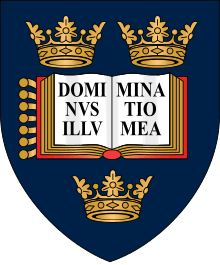Faculty of Law, University of Oxford

The Faculty of Law, Oxford is the law school of the University of Oxford which has a history of over 800 years of teaching and writing law.[1] It is unique in its use of personalised tutorials, in which students are taught by faculty fellows in groups of one to three on a weekly basis,[2] as the main form of instruction in its undergraduate and graduate courses. It offers the largest doctoral programme in Law in the English-speaking world.[3]
Generally considered one of the most prestigious in the world, Oxford's law school is currently ranked second in the 2016 QS World University Rankings, behind only Harvard Law School.[4] Oxford has produced a significant number of luminaries in law and politics, including United Kingdom Prime Minister Tony Blair. Amongst those associated with Oxford law include twelve Lord Chancellors, nine Lord Chief Justices, nine UK Supreme Court Justices (including current President of the Supreme Court Lord Neuberger, who read chemistry before turning to law[5]) and twenty-two law lords (such as Lord Hoffmann, Lord Denning); four associate justices of the US Supreme Court as well as six puisne justices of the Supreme Court of Canada and a chief justice of the now defunct Federal Court of Canada; several heads of state around the world, including John Turner, Prime Minister of Canada (1984-1984), Seni Pramoj (1947-1951), Prime Minister of Thailand, and several Prime Ministers of Pakistan, including Liaquat Ali Khan (1947–1951), Huseyn Shaheed Suhrawardy (1956–1957), Zulfikar Ali Bhutto (1945-1946).
History
There were faculties of Civil Law and Canon Law in the medieval University. During the Reformation, Henry VIII prohibited the teaching of Canon Law, instead founding the Regius Chair of Civil Law, one of the oldest Professorships at the University of Oxford. From then until the 19th century, the University awarded the Bachelor of Civil Law and the Doctor of Civil Law, through the Faculty of Civil Law.
William Blackstone, a graduate of Pembroke College, Oxford and subsequently a Fellow of All Souls, Oxford, was appointed the inaugural Vinerian Professor of English Law in 1758, and was the first professor at any university to teach the common law. His lectures formed the basis for his Commentaries on the Laws of England, a definitive source of and case for the study of the English common law.[6][7][8]
It was not until the 1870s that Oxford offered a degree in English law, the BA in Jurisprudence. Not long after, Cornelia Sorabji was the first woman to read Law at Oxford in 1889.[9][10] In the late 19th and early 20th centuries, there were prominent professors in Oxford such as Frederick Pollock, William Anson, and Albert Dicey. The emergence of a large community of legal scholars in twenty-five men's colleges can be dated from the 1920s and 1930s, but the development was consolidated in the 1950s and 1960s, when Law Fellowships also became common in the women's colleges. The Oxford law school flourished through the operation of the resulting internal market, and through the brilliance of particular leading scholars such as H. L. A. Hart, Rupert Cross, Tony Honoré, John Morris, Peter Carter, and others.[11]
In the twentieth century, the BCL became a master's level degree; and, by the 1970s, Oxford developed a large graduate programme in law. It has been claimed that the BCL at Oxford is "the most highly regarded taught masters-level qualification in the common law world".[12] The DPhil in Law, which dates to the 1910s, became popular at that time particularly in international law, comparative law, and philosophy of law; after the 1970s, the areas of research pursued in the doctoral programme broadened to make it a general training ground for legal academics. In 2010 the MSc in Law and Finance (MLF) was introduced and is taught jointly by the Faculty of Law and the Saïd Business School. The MLF programme involves a combination of finance and economic courses combined with BCL law courses.[13] Like the BCL taught at Oxford, entry into the MLF is highly competitive with on average less than fifteen per cent of applicants being accepted.
Programs Offered
The BA in Jurisprudence is Oxford's regular three year undergraduate law degree, equivalent to what in some universities would be called an LLB. It is also a 'qualifying law degree' for the purpose of practice as a solicitor or barrister in England and Wales. It is 'one of the most highly regarded undergraduate law degrees in the UK, and those who do well in it are in high demand both in the legal professions and in other fields in which professional analytical work is required'.[14]
Oxford's graduate law programme is unique: the BCL and MJur (for students from a civil law background) are the only graduate law degrees in the world which are taught through tutorials as well as seminars and lectures. Oxford's graduate law students have closer contact with their teachers than on any LLM. Oxford is renowned for the size, strength, and diversity of its community of legal scholars who are drawn from around the world, and students benefit from the opportunities they are given to discuss their work with leading academics in the field.
Taught programs include: the Bachelor of Civil Law (BCL) - for practitioners and academics alike, Oxford's Bachelor of Civil Law (BCL) degree is the most highly regarded taught masters-level qualification in the common law world;[15] the Oxford Magister Juris (MJur) - designed for outstanding law students from non-common law backgrounds, it is a counterpart to the BCL and shares all its courses; the Masters in Law and Finance (MSc) is taught with the Saïd Business School, and offers outstanding students with a legal background the opportunity to integrate the study of finance with advanced legal study; the Master of Science in Criminology and Criminal Justice (MSc) is a specialist one-year programme run by Oxford's Centre for Criminology; the Master of Philosophy in Criminology (MPhil) is a one-year degree available only to those proceeding from the Oxford MSc in Criminology; the Postgraduate Diploma in Intellectual Property Law and Practice is a one-year part-time masters-level course for people embarking on a career in IP law and practice; the Master of Studies in International Human Rights Law is a part-time graduate degree studied over 22 months, offered by Oxford University's Department for Continuing Education.
Oxford has the largest graduate research programme in Law in the English-speaking world, with a community of about 200 research students engaged in master's and doctoral research across a wide range of legal and interdisciplinary specialisms corresponding to the diverse interests of faculty members. Research students play a central role in the intellectual life of the Faculty, collaborating in numerous discussion groups and seminars. Research programs include: the Master of Studies in Legal Research (MSt) - an entry-level one-year research degree that can also serve as the first year of a DPhil; the Master of Philosophy in Law (MPhil) - a one-year research degree that can also serve as the first year of a DPhil, available only to those proceeding from the Oxford BCL or MJur taught postgraduate programmes; the Master of Letters (MLitt) - an intermediate-level two-year research degree; the Doctor of Philosophy (DPhil) - a major research degree requiring three to four years of study and setting the highest standards of academic achievement.[16]
Rankings and Reputation
| QS[17] (2016/17, national) | 1 | |
|---|---|---|
| QS[18] (2016/17, world) | 2 | |
| Complete[19] (2017, national) |
2 | |
| The Guardian[20] (2017, national) |
2 | |
Oxford's Law Faculty is considered one of the very best in the world and consistently ranks amongst the top three worldwide. Oxford is currently ranked as the best in the UK and second in the world in the latest QS World University Rankings, behind only Harvard Law School;[4] within the UK, it is currently ranked second (behind Cambridge) respectively in the Complete University Guides,[21] Telegraph Rankings,[22] and the Guardian Rankings.[23] Its acceptance rate was less than 15% in the 2014-15 academic cycle.[24] Oxford's BCL programme has been described as "the most highly regarded taught masters-level qualification in the common law world".[25] A first-class in undergraduate degree in Law or equivalent is a prerequisite (as a guide a student will need to be in the top 5% of his or her graduating class), with the same applying for the Oxford Magister Juris (MJur). With the Masters in Law and Finance (MSc), Oxford requires an undergraduate degree in law or an outstanding academic record comprising a non-law undergraduate degree and a graduate or professional qualification in law; as for the Postgraduate Diploma in Intellectual Property Law and Practice, an upper second-class undergraduate degree in Law is required. For research programmes, an outstanding record in earlier higher education and the skills and commitment to pursue research to the highest level are required by applicants for postgraduate research programmes. It is very rare for a candidate to be admitted without having completed a degree in Law, except in socio-legal studies and criminology.[16]
Academics
Research centres and Institutes
The Faculty has a number of research centres and institutes:
- Centre for Criminology
- Centre for Socio-Legal Studies
- Institute of European and Comparative Law
- Oxford Intellectual Property Research Centre
- Bonavero Institute of Human Rights
- Centre for Business Taxation
Research activity groups
- Business Law Hub
- Oxford Business Law Blog
- Centre for Competition Law and Policy
- Commercial Law Centre
- Human Rights Law
- Labour Law
- Legal Philosophy in Oxford
- The Oxford-Burma/Myanmar Law Programme
- Oxford Pro Bono Publico
- Oxford Transitional Justice Research
- Public International Law
- Roman Law
- Tax Law
Oxford Pro Bono Publico (OPBP)
The Oxford Pro Bono Publico (OPBP) is an organisation consisting of graduate law students and members of faculty to provide high-quality comparative law research, gratis, for lawyers acting pro bono around the world as well as promoting pro bono law in general.[26]
Facilities
St Cross Building

The Law Faculty offices are situated in the St Cross Building, which is a Grade II listed building, designed by the late Sir John Leslie Martin (architect of the Royal Festival Hall in London) and Colin St John Wilson (architect of the New British Library). The St Cross Building is also home to the Bodleian Law Library.[27]
Bodleian Law Library

The Bodleian Law Library was opened in 1964 and holds over 450,000 volumes. It is a Legal Deposit Library, allowing it to claim a copy of any printed legal material published in the United Kingdom or Ireland. It is also an official Documentation Centre for the European Union.[28]
Notable individuals
See main article: List of University of Oxford people in the law
Notable alumni
The following notable individuals have read law at the Faculty of Law, Oxford.
Judiciary
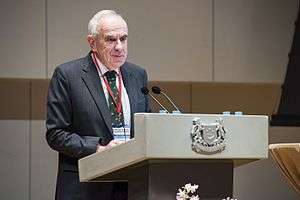
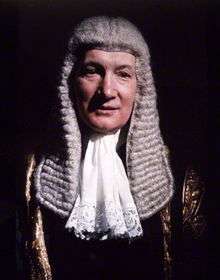

.jpg)
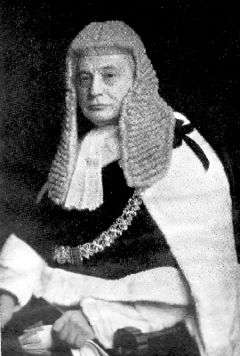
- International Court of Justice
- Sir Humphrey Waldock
- European Court of Human Rights
- Sir Nicolas Bratza, President of the European Court of Human Rights (2011–2012)
- Paul Mahoney
- Lord Chief Justice of England and Wales
- Rayner Goddard, Baron Goddard (1946–1958)
- Peter Taylor, Baron Taylor of Gosforth (1992–1996)
- Supreme Court of the United Kingdom
- Lords of Appeal in Ordinary
- Keeper or Master of the Rolls and Records of the Chancery of England
- Alfred Denning, Baron Denning (19 April 1962 – 29 September 1982)
- Court of Appeal of England and Wales
- Sir Brian Leveson, current President of the Queen's Bench Division
- Sir Michael Fox
- Sir Bernard Rix
- High Court of Justice
- Sir Robert Jay, counsel to the Leveson Inquiry
- Constitutional Court of South Africa
- High Court of Australia
- Supreme Court of Canada
- Supreme Court of New Zealand
- Supreme Court of the United States
- John Marshall Harlan II
- David Souter
- Byron White (Rhodes Scholar; did not graduate)
- Federal Court of Australia
- Supreme Court of South Australia
- John Doyle, Chief Justice (1995–2012)
- Supreme Court of Western Australia
- David Malcolm, Chief Justice (1988–2006)
- Andrew Beech
- James Edelman
- Carmel McLure
- Court of Appeal of Hong Kong
- Aarif Tyebjee Barma, Justice of Appeal of the Court of Appeal of the High Court of Hong Kong
Legal
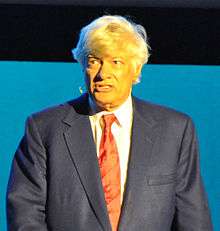
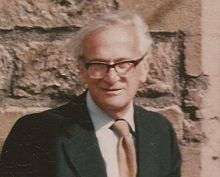
- Director of Public Prosecutions (England and Wales)
- Sir Thomas Hetherington QC (1977–1987)
- Dame Barbara Mills QC (1992–1998)
- Sir Keir Starmer QC (2008–2013)
- Solicitor-General of Australia
Human rights
- Amal Clooney
- Ben Emmerson QC
- Lord Pannick QC
- Geoffrey Robertson QC
- Jennifer Robinson
- Cornelia Sorabji
Academia
- Andrew Ashworth
- Henry Angus
- Peter Birks
- Sir William Blackstone KC
- Sir Ian Brownlie
- Peter Cane
- Simon Chesterman
- Hugh Collins
- James Crawford SC
- Sir Rupert Cross
- A. V. Dicey
- Ronald Dworkin
- John Eekelaar
- Timothy Endicott
- John Finnis
- Bernard Gardiner, Vice-Chancellor of the University of Oxford (1712–1715)
- John Gardner
- Sir William Searle Holdsworth
- Sir Neil MacCormick
- Joseph Raz
- Ben Saul
- Jane Stapleton
- Graham Virgo
- Jeremy Waldron
- Wil Waluchow
- Ivy Williams
Politics
.jpg)
- Heads of state
- Olav V of Norway, King of Norway
- Vajiravudh, King of Siam (did not graduate)
- Wasim Sajjad, President of Pakistan
- Heads of government
- Tony Blair, Prime Minister of the United Kingdom (1997–2007)
- John Turner, Prime Minister of Canada (1984–1984)
- Liaquat Ali Khan, Prime Minister of Pakistan (1947–1951)
- Huseyn Shaheed Suhrawardy, Prime Minister of Pakistan (1956–1957)
- Zulfikar Ali Bhutto, Prime Minister of Pakistan (1973–1977)
- Seni Pramoj, Prime Minister of Thailand (1945-1946)
- Governor-General of Australia
- Attorney-General for Australia
- Peter Durack (1977–1983)
- Daryl Williams (1996–2003)
- George Brandis (2013–present)
- Other politicians
Other
- Journalism
- Business
- Allan Myers QC, Australia's wealthiest barrister[29]
- Other
Notable academics
The following notable individuals are or have been academics of the Faculty of Law, Oxford.
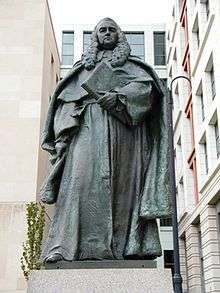
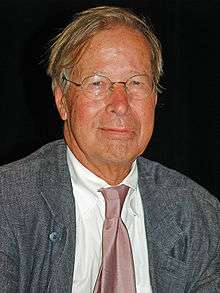
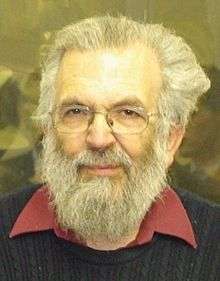
- Chichele Professor of Public International Law
- Ian Brownlie
- Vaughan Lowe
- Humphrey Waldock, Judge of the International Court of Justice
- Family Law
- Professor of Jurisprudence
- Henry Maine (1869–1877)
- Frederick Pollock (1883–1903)
- Paul Vinogradoff (1903–1925)
- Arthur Goodhart (1931-1951)
- H. L. A. Hart (1952-1969)
- Ronald Dworkin (1969-1998)
- John Gardner (2000-2016)
- Other jurisprudence scholars
- Timothy Endicott, Professor of Legal Philosophy and Dean of the Faculty of Law
- John Finnis, Professor of Law
- Leslie Green, Professor of the Philosophy of Law
- Tony Honoré, Emeritus Regius Professor of Civil Law (Oxford)
- Joseph Raz, Professor of the Philosophy of Law
- Jeremy Waldron, Chichele Professor of Social and Political Theory
- Peter Cane, former Professor of Law and current Distinguished Professor at the Australian National University
- Vinerian Professor of English Law
- Sir William Blackstone (1758–1766)
- Sir Robert Chambers (1766–1777)
- Richard Wooddeson (1777–1793)
- James Blackstone (1793–1824)
- Philip Williams (1824–1843)
- John Robert Kenyon (1844–1880)
- Albert Venn Dicey (1882–1909)
- William Martin Geldart (1909–1922)
- William Searle Holdsworth (1922–1944)
- Geoffrey Chevalier Cheshire (1944–1949)
- Harold Greville Hanbury (1949–1964)
- Sir Rupert Cross (1964–1979)
- Sir Guenter Treitel (1979–1996)
- Andrew Ashworth (1997–2012)
- Hugh Collins (2012–present)
References
- ↑ "Law - UNIQ Summer Schools at the University of Oxford".
- ↑ "Studying at Oxford".
- ↑ "Law in Oxford".
- 1 2 "QS World University Rankings by Subject 2016 - Law". 2016-03-17. Retrieved 2016-10-05.
- ↑ "The Panel on Fair Access to the Professions: David Neuberger". Cabinet Office. 23 February 2009. Retrieved 28 July 2009.
- ↑ "Law - All Souls College".
- ↑ "The Pembroke Legal Tradition".
- ↑ "Alumni and other Notable Pembrokians".
- ↑ "First lady - Moneylife".
- ↑ "Celebrating Indian legacy in Oxford".
- ↑ Lawson, F.H. (1968). The Oxford Law School 1850-1960. Oxford University Press.
- ↑ "BCL & MJur 2015/16 E-Brochure". University of Oxford, Faculty of Law. Retrieved 13 August 2015.
- ↑ "MSc in Law and Finance | University of Oxford". www.ox.ac.uk. Retrieved 2016-05-31.
- ↑ "BA in Jurisprudence".
- ↑ "BCL & MJur 2015/16 E-Brochure". University of Oxford, Faculty of Law. Retrieved 13 August 2015.
- 1 2 "LLM Guide, University of Oxford".
- ↑ "QS World University Rankings 2016/17 - United Kingdom". Quacquarelli Symonds Ltd. Retrieved 7 September 2016.
- ↑ "QS World University Rankings 2016/17". Quacquarelli Symonds Ltd. Retrieved 7 September 2016.
- ↑ "University League Table 2017". The Complete University Guide. Retrieved 25 April 2016.
- ↑ "University league tables 2017". The Guardian. 23 May 2013. Retrieved 23 May 2016.
- ↑ "Law - Top UK University Subject Tables and Rankings 2017". Retrieved 2016-10-18.
- ↑ "The best UK universities for law". Telegraph.co.uk. Retrieved 2016-10-18.
- ↑ "University guide 2017: league table for law". the Guardian. Retrieved 2016-10-18.
- ↑ "UoO_UG_Admissions". Tableau Software. Retrieved 2016-10-18.
- ↑ "BCL & MJur 2015/16 E-Brochure". University of Oxford, Faculty of Law. Retrieved 13 August 2015.
- ↑ "Oxford Law :: OPBP - Oxford Pro Bono Publico". Faculty of Law, Oxford.
- ↑ "The St Cross Building".
- ↑ "Bodleian Law Library".
- ↑ Gluyas, Richard (10 June 2008). "Mystery brew powers silk Allan Myers to rich list". The Australia.
